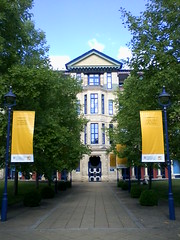"Tom will give impressions of his travels in July to Hong Kong and Cambridge University. He is attending the Second International Conference on Open and Flexible Education (ICOFE 2015) at Hong Kong Open University and a speaking at the 10th International Conference on Computer Science & Education at Cambridge University."
Open as in Education
The word "open" is used in several different contexts in education. An Open University, is open in the sense of allowing entry to education to a wider range of people than usual for higher education. This can be by having lower fees, by allowing those without formal prerequisites, awarding course credit for prior experience, having classes outside business hours and having distance education.
Open Access is used to describe educational materials which are available free, or at low cost, for use, reuse, modification, directly by students, or by teachers. This is usually with a Creative Commons Attribution-ShareAlike Licence (CC BY-SA 3.0).More Talk Than Action on Mobile and Open Education
My impression from attending a conference on mobile education is that while academics talk about it, there does not appear to be much done in practice. Also there sill does not appear to be a sustainable way to support open education: this is something done as an initiative, sometimes with a one off grant, but which then ends when the money runs out. At the same time universities continue with conventional courses which have on-line components added in an ad-hoc way. Meanwhile the universities nervously look over their shoulders to see if MOOCs from large US universities are going to take away their students. The reality is that MOOCs are mostly used as a form of university extension program, providing introductory courses to promote the real university programs which are not massive, open, on-line or low cost.Dominance of Moodle for University E-learning
Institutions ranging from Hong Kong Open University to Cambridge University (UK) use Moodle for their Learning Management System. Australia could make more use of this to sell add-on products and services.Hong Kong
ICOFE 2015
Second International Conference on Open and Flexible Education (ICOFE 2015) at Hong Kong Open University. HKOU uses Moodle. Went from Guangzhou to Hong Kong by Train. Just about everyone on the train had a large screen smart phone and a second battery to keep it running on the journey. Seats with mains power are at a premium and USB charing sockets sought after at airports.
Went from Guangzhou to Hong Kong by Train. Just about everyone on the train had a large screen smart phone and a second battery to keep it running on the journey. Seats with mains power are at a premium and USB charing sockets sought after at airports.Open University of Hong Kong (OUUK) consists of two multistory buildings in Kowloon. There is no "campus" as such. The meeting room where the conference was held doubles as a basketball court (the hoops swing down from the very high ceiling).
Cambridge
ICCSE 2015
10th International Conference on Computer Science & Education at Cambridge University:- Quickly developing online versions of learning materials for graduate students, Tom Worthington's talk for the Office of Scholarly Communication, University of Cambridge (UK). Also presented at ICCSE 2015. Notes by Danny Kingsley
- Time-shifted Learning: Merging Synchronous and Asynchronous Techniques for E-Learning, Tom Worthington, for ICCSE 2015,
- Denix Dai, Ataturk University is demonstrating a database of computer engineering education in Turkey.
- Ben M. Chen, National University of Singapore on "Unmanned Systems Research and Education".
- Professor Clarence W. de Silva, British Columbia University, on "Sensing Issues in the Automated Monitoring of the Quality of Drinking Water"


Talk for Cambridge University Librarians
Cambridge University uses Moodle. Discussed "Quickly developing online versions of learning materials for graduate students" for library staff at Cambridge University (also Notes by Dr Danny Kingsley, Head of the University of Cambridge Office of Scholarly Communication).Visit to Centre for Entrepreneurial Learning
 Talked to Joanna Mills,
Deputy Director, Centre for Entrepreneurial Learning, Judge Business School, University of
Cambridge about emulating the The Cambridge Phenomenon (Silicon Fen) in Canberra.
Talked to Joanna Mills,
Deputy Director, Centre for Entrepreneurial Learning, Judge Business School, University of
Cambridge about emulating the The Cambridge Phenomenon (Silicon Fen) in Canberra.
ps: It is worth attending a free SLUG meeting, to get to see the Google offices.


No comments:
Post a Comment